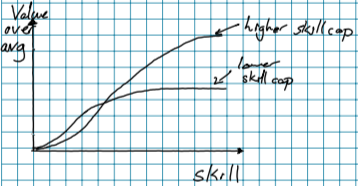EDIT: I'm only going to answer a few more questions, due to time constraints. I might eventually come back and answer more. I still appreciate getting replies with people's thoughts on things I've written.
I'm going to do an AMA on Tuesday next week (November 19th). Below I've written a brief description of what I'm doing at the moment. Ask any questions you like; I'll respond to as many as I can on Tuesday.
Although I'm eager to discuss MIRI-related things in this AMA, my replies will represent my own views rather than MIRI's, and as a rule I won't be running my answers by anyone else at MIRI. Think of it as a relatively candid and informal Q&A session, rather than anything polished or definitive.
----
I'm a researcher at MIRI. At MIRI I divide my time roughly equally between technical work and recruitment/outreach work.
On the recruitment/outreach side, I do things like the following:
- For the AI Risk for Computer Scientists workshops (which are slightly badly named; we accept some technical people who aren't computer scientists), I handle the intake of participants, and also teach classes and lead discussions on AI risk at the workshops.
- I do most of the technical interviewing for engineering roles at MIRI.
- I manage the AI Safety Retraining Program, in which MIRI gives grants to people to study ML for three months with the goal of making it easier for them to transition into working on AI safety.
- I sometimes do weird things like going on a Slate Star Codex roadtrip, where I led a group of EAs as we travelled along the East Coast going to Slate Star Codex meetups and visiting EA groups for five days.
On the technical side, I mostly work on some of our nondisclosed-by-default technical research; this involves thinking about various kinds of math and implementing things related to the math. Because the work isn't public, there are many questions about it that I can't answer. But this is my problem, not yours; feel free to ask whatever questions you like and I'll take responsibility for choosing to answer or not.
----
Here are some things I've been thinking about recently:
- I think that the field of AI safety is growing in an awkward way. Lots of people are trying to work on it, and many of these people have pretty different pictures of what the problem is and how we should try to work on it. How should we handle this? How should you try to work in a field when at least half the "experts" are going to think that your research direction is misguided?
- The AIRCS workshops that I'm involved with contain a variety of material which attempts to help participants think about the world more effectively. I have thoughts about what's useful and not useful about rationality training.
- I have various crazy ideas about EA outreach. I think the SSC roadtrip was good; I think some EAs who work at EA orgs should consider doing "residencies" in cities without much fulltime EA presence, where they mostly do their normal job but also talk to people.


(This is true of all my answers but feels particularly relevant for this one: I’m speaking just for myself, not for MIRI as a whole)
We’ve actually made around five engineer hires since then; we’ll announce some of them in a few weeks. So I was off by a factor of two.
Before you read my more detailed thoughts: please don’t read the below and then get put off from applying to MIRI. I think that many people who are in fact good MIRI fits might not realize they’re good fits. If you’re unsure whether it’s worth your time to apply to MIRI, you can email me at buck@intelligence.org and I’ll (eventually) reply telling you whether I think you might plausibly be a fit. Even if it doesn't go further than that, there is great honor in applying to jobs from which you get rejected, and I feel warmly towards almost everyone I reject.
With that said, here are some of my thoughts on the discrepancy between my prediction and how much we’ve hired:
A few notes based on this that are relevant to people who might want to work at MIRI: